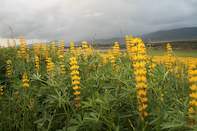
Cape Town based weekend farmer, Andrew Ardington, became obsessed with regenerative agriculture after he learnt about the positive ways in which it could transform food production in South Africa and reduce the environmental damage caused by the way we currently produce our food.
In the absence of South African based knowledge and literature on this farming approach, Andrew Ardington in 2019 founded the Regenerative Agricultural Association of South Africa, RegenAG SA, to give South African producers a platform where they can share ideas and reflect on their regenerative farming journey and create a community.
Since 2015, regenerative agriculture has become one of the latest buzzes in South African agriculture.
The farming approach makes use of conservation farming techniques, such as crop rotation, minimum to no-till and stubble retention, but is more advanced than conservation farming since it also includes the use of cover crops and environmentally friendly inputs, such as compost and manure.
The majority of crop farmers following regenerative agricultural practices also acquire an animal component, to add fertility and diversity to production.
Where the goal of conservation farming is to “conserve” and “sustain” what is in the system, regenerative agriculture attempts to improve the system and leave it healthier and better than before. This in turn should allow farmers to reduce their input costs and reduce their environmental footprint.
While the approach is not organic, most of the producers try to mimic natural systems and use as little as possible chemical inputs. Regenerative farmers see the agricultural system as a continuously evolving living organism, realising that strategies that work today might not be relevant tomorrow. To make the right decisions at the right time, they therefore need to be highly attuned to nature and what is happening on their farms.
Regenerative agriculture does not allow tillage, which is allowed by some organic certification bodies, as this practice is damaging to the soil structure and soil organisms.
It is also a more holistic farming approach, leaning more towards biodynamic production, but with fewer restrictions in terms of labelling, certification, and what farmers are or are not allowed to do.
 South Africa’s agricultural sector is one of the world’s most diverse, consisting of corporate and private intensive and extensive crop ...
South Africa’s agricultural sector is one of the world’s most diverse, consisting of corporate and private intensive and extensive crop ...